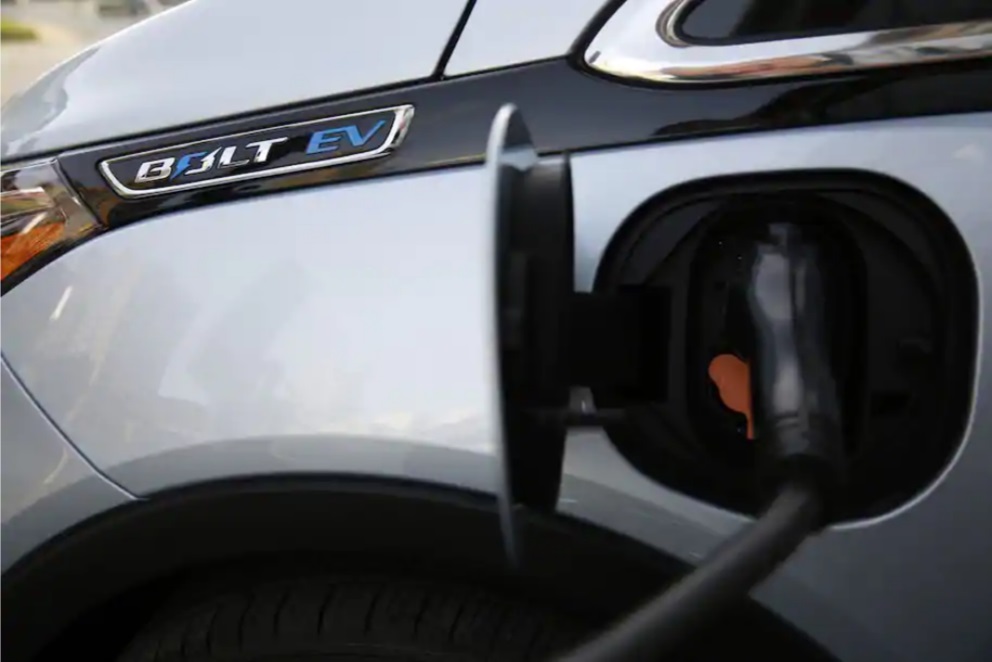General Motors said today that it will end the sale of all gasoline and diesel powered passenger cars and light sports utility vehicles by 2035, marking an historic turning point for the iconic American automobile company and promising a future full of new electric vehicles for American motorists.
WAPO: GM chief executive Mary Barra, who antagonized many climate experts by embracing Donald Trump’s relaxation of fuel efficiency targets, said the company would eliminate all tailpipe emissions from light duty vehicles by that date.
“As one of the world’s largest automakers, we hope to set an example of responsible leadership in a world that is faced with climate change,” she said on LinkedIn.
The carmaker will spend $27 billion on electric vehicles and associated products between 2020 and 2025, outstripping investment on conventional gasoline and diesel cars, GM has said.
That figure includes refurbishing factories and investing in battery production in conjunction with LG Chem, a South Korean battery maker.
As part of its plan, GM will manufacture about 30 types of electric vehicles, about 20 of which would be for sale in the United States.
The company’s stock was up nearly 4 percent in late afternoon trading.
The move toward ending tailpipe emissions won’t affect medium and heavy duty trucks, but it will include everything from cars and crossovers to full-size SUVs, such as the light-duty Silverado and Yukon, a company spokeswoman said.
Fred Krupp, president of the Environmental Defense Fund, which had worked with GM on its plan, called it a “breakthrough moment.”
“And it’s part of a wave of industry action that reinforces what the Biden Administration is doing,” Krupp said.
President Biden on Wednesday detailed an ambitious far-reaching plan to transition the U.S. economy away from oil, gas and coal and toward solar, wind and other clean energy, saying the country must lead the global effort to cut the pollution that is driving climate change and speeding the planet toward environmental catastrophe.
Among a series of actions, Biden signed an executive order that calls for the federal fleet of approximately 645,000 vehicles to be converted to electric power.
Biden’s plan “creates demand and drives down costs as privately owned fleets follow suit,” Krupp said.
But some critics said that GM still hadn’t publicly joined four other automakers that agreed to comply with California’s fuel efficiency standards, which are more stingent than the federal targets under Trump.
The California settlement is an important benchmark in restarting negotiations between auto companies, the California Air Resources Board, and the Biden administration over cutting greenhouse gas emissions in the transport sector.
GM’s statement also left some wiggle room in continuing internal combustion engines, critics noted.
The company did not rule out using carbon offsets or credits “if absolutely necessary” to reach its goal of eliminating tailpipe emissions.
That means GM could invest in programs that remove carbon dioxide from the air, such as tree planting, and still sell some gasoline-powered vehicles.
And GM said that its plans for “decarbonizing and transitioning to 100 percent EVs” would take place “as supported by our commitment to setting science-based targets.”
Dan Becker, director of the Safe Climate Transport Campaign at the Center for Biological Diversity, said “given GM’s polluting track record, their promise to arrange some offsets for pollution” meant that the company’s plan was ” just blue smoke and mirrors.”
Others applauded GM’s move.
By pledging to go carbon neutral, “GM demonstrates that members of the auto industry are committed to tackling the global climate crisis and decarbonizing the transportation sector,” said Rep. Debbie Dingell(D-Mich), who is a former GM executive and also served as president of the General Motors Foundation.
“We have had discussions for months with the auto industry, labor unions, and the environmental community on concrete actions like this that must be taken to reach carbon neutrality.”
“Even as we celebrate this announcement, we need to keep our focus on creating jobs, confronting climate change, and the transformation of an innovative mobility industry,” Dingell said in a statement.
Paul Beldsoe, a former climate advisor in the Clinton White House, said GM is setting the tone for the U.S. manufacturing.
“When America’s most iconic manufacturer commits to carbon neutrality that’s a huge signal to the rest of the economy,” said Bledsoe, who is now at the Progressive Policy Institute, said. “At the same time, it’s clear GM is trying to burnish its reputation from past practices and justify new tax incentives.”
